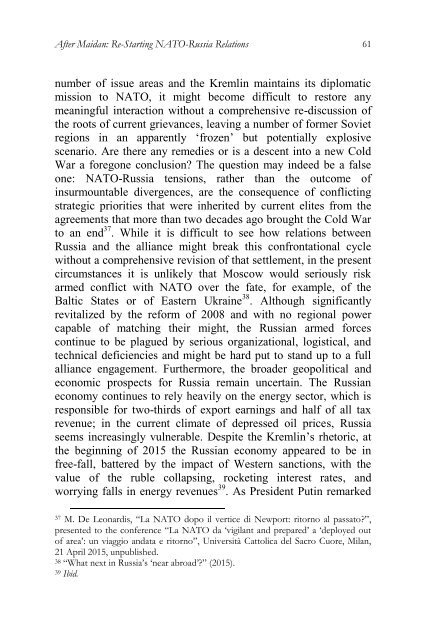beyondukraine.euandrussiainsearchofanewrelation
beyondukraine.euandrussiainsearchofanewrelation
beyondukraine.euandrussiainsearchofanewrelation
Create successful ePaper yourself
Turn your PDF publications into a flip-book with our unique Google optimized e-Paper software.
After Maidan: Re-Starting NATO-Russia Relations 61<br />
number of issue areas and the Kremlin maintains its diplomatic<br />
mission to NATO, it might become difficult to restore any<br />
meaningful interaction without a comprehensive re-discussion of<br />
the roots of current grievances, leaving a number of former Soviet<br />
regions in an apparently ‘frozen’ but potentially explosive<br />
scenario. Are there any remedies or is a descent into a new Cold<br />
War a foregone conclusion? The question may indeed be a false<br />
one: NATO-Russia tensions, rather than the outcome of<br />
insurmountable divergences, are the consequence of conflicting<br />
strategic priorities that were inherited by current elites from the<br />
agreements that more than two decades ago brought the Cold War<br />
to an end 37 . While it is difficult to see how relations between<br />
Russia and the alliance might break this confrontational cycle<br />
without a comprehensive revision of that settlement, in the present<br />
circumstances it is unlikely that Moscow would seriously risk<br />
armed conflict with NATO over the fate, for example, of the<br />
Baltic States or of Eastern Ukraine 38 . Although significantly<br />
revitalized by the reform of 2008 and with no regional power<br />
capable of matching their might, the Russian armed forces<br />
continue to be plagued by serious organizational, logistical, and<br />
technical deficiencies and might be hard put to stand up to a full<br />
alliance engagement. Furthermore, the broader geopolitical and<br />
economic prospects for Russia remain uncertain. The Russian<br />
economy continues to rely heavily on the energy sector, which is<br />
responsible for two-thirds of export earnings and half of all tax<br />
revenue; in the current climate of depressed oil prices, Russia<br />
seems increasingly vulnerable. Despite the Kremlin’s rhetoric, at<br />
the beginning of 2015 the Russian economy appeared to be in<br />
free-fall, battered by the impact of Western sanctions, with the<br />
value of the ruble collapsing, rocketing interest rates, and<br />
worrying falls in energy revenues 39 . As President Putin remarked<br />
37 M. De Leonardis, “La NATO dopo il vertice di Newport: ritorno al passato?”,<br />
presented to the conference “La NATO da ‘vigilant and prepared’ a ‘deployed out<br />
of area’: un viaggio andata e ritorno”, Università Cattolica del Sacro Cuore, Milan,<br />
21 April 2015, unpublished.<br />
38 “What next in Russia’s ‘near abroad’?” (2015).<br />
39 Ibid.


